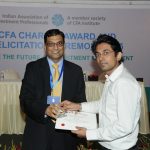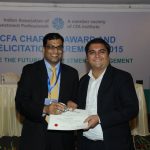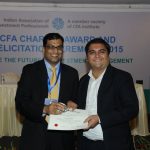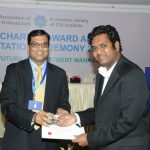- February 7, 2016
- Posted by:
- Category:Bengaluru, BLOG, Events, Speaker Events
Contributed By: Aneek Saha & Srinivasa Sharan CFA
IAIP had the pleasure of hosting Harish Bijoor for a thoughtful discussion on the concept of Clean Practice Branding at Bengaluru on Jan 28. Harish is a Brand-guru and CEO of Harish Bijoor Consults Inc. (a private label consulting firm that specializes in Branding and Business strategy). He began his interactive session by noting that we may need to move beyond best practices in branding, given today’s complex business structures. The audience then explored the definition of a brand – some answers were that it meant a promise, recognition, premium, perception and differentiation.
According to Harish, a brand is a ‘thought’ and is ‘maya’ (an illusion), which means that a brand represents different thoughts for different people. He gave examples relating to Salman Khan, Baba Ramdev, Harley Davidson, Kingfisher beer, all of which are brands for different reasons. He also spoke about the two conflicting schools of thought with regard to what a brand was. One school was that a brand is tangible. A brand has to have substance behind it, otherwise the brand would not survive the test of time. An iPhone may be a premium product but it is miles ahead of its competitors in terms of design, aesthetics, functionality and technological prowess. A Guinness Beer has earned its reputation because it has been in existence since the 1800s, its grows its own hops, has its own casks and barrels, has a patented process of brewing fine quality beer, designs its own bottles and so on. The other school of thought is that a brand is a commodity and that there is nothing different from a branded good and a non-branded one, with only context being important.
Harish went on to state that one needs to stay close to the truth while building the brand. He noted that the trigger point for all business was the consumer and that there were two currencies – time and money. While an accounting system for money has been developed by Luca Pacioli, a Venetian monk in the 15th century, an accounting system for time has still not been created. He also believes that time is more valuable than money – as time can be spent (and not regained) while money can be earned and noted that impatience was a virtue given the value of time.
Finally, Harish explained the concept of Clean Practice Branding. Stating that ‘clean’ would be a buzz word for the future, clean practices in branding would mean that brands and businesses would have to establish their benefit for society. According to him, markets of the future would have to be created, with the top 2 billion people taking care of the bottom 5 billion people in society. Similarly, companies would need to focus on both the present and the future to develop brand value.
To conclude, the session on Clean Practice Branding was a very engaging and useful discussion about the concept of a Brand and how Clean Practice Branding may be the way forward for many organizations.
-AS & SS





